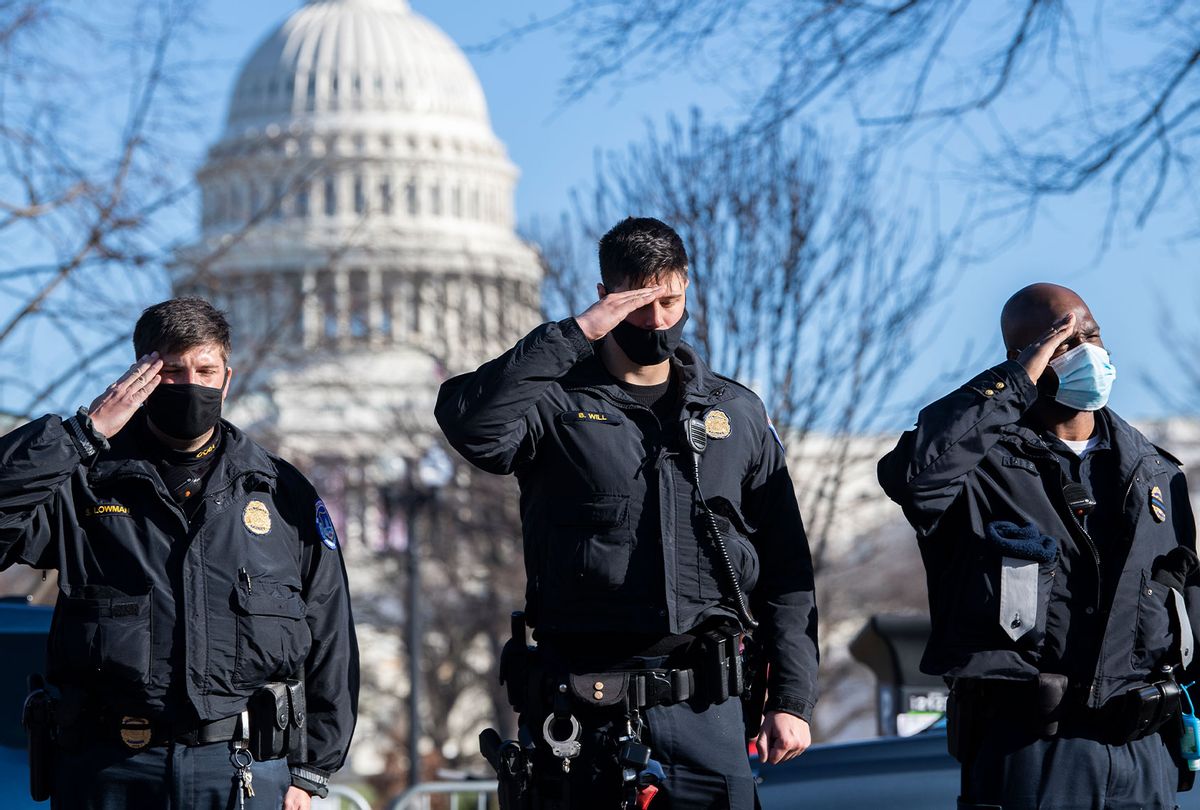Slain U.S. Capitol Police Officer Brian Sicknick was laid to rest on Wednesday after a two-day funeral procession that included lying in honor in the Capitol Rotunda, where both Presiden Joe Biden and Vice President Kamala Harris laid their hands on his urn in remembrance of the veteran officer who died in the line of duty defending Congress from an insurrectionist mob.
"We will never forget his sacrifice," House Speaker Nancy Pelosi, D-Calif., said of Sicnick's "heroism."
Despite the widespread political sniping elsewhere on Capitol Hill on Wednesday, Sicnick, only the fifth person to lie in honor in the Capitol Rotunda, drew bipartisan condolences.
"Four weeks ago, the Rotunda was strewn with the debris of an insurrectionist mob," Senate Minority Leader Mitch McConnell, R-Ky., said. "Today, we mourn and give thanks for the true patriot who lies in the Rotunda."
In a closed-door briefing with the House Appropriations Committee last week, the Acting Capitol Police chief addressed members of Congress –– many of whom narrowly escaped from the hands of right-wing insurgents –– to apologize for what was an undeniable security failure during the Capitol riot, according to CNN.
"We knew that there was a strong potential for violence and that Congress was the target," said Capitol Police Chief Yogananda D. Pittman, adding, "The Department prepared in order to meet these challenges, but we did not do enough." Pittman explained that the on-site police force on Jan 6, which stood at 1,200 officers (with only 170 in riot gear), was completely overwhelmed by the hundreds of pro-Trump attendees who would violently crossed police lines.
According to House Appropriations Committee Chair Rosa DeLauro, D-CT, the meeting left members of Congress "shaking their heads in disbelief" as they attempted to make sense of why the Capitol had not been fortified adequately despite there being ample intelligence to do so. "They had the information. They did not act on it," stated DeLauro, "And a question that I have, and one that I think we need to get to the bottom of, is who made the decision not to act?"
In the days leading up to the riot, Capitol police had intelligence that white supremacist groups with histories of violence would be attending the rally and marching to the Capitol. "We knew that militia groups and white supremacists organizations would be attending," Pittman said, "We also knew that some of these participants were intending to bring firearms and other weapons to the event. We knew that there was a strong potential for violence and that Congress was the target."
Despite this intel, Capitol police rejected a request by former Capitol Police Chief Steven Sund on Jan 4 for security reinforcement by the National Guard, according to Politico. J. Brett Blanton, the Architect of the Capitol, however, disputed Pittman's testimony that any request was made at all, alleging that there was nothing on record being "submitted to the board… prior to January 6, 2021."
On the day of the attack, Sund made another request to the Capitol police board –– this one on record –– asking for additional support. However, the authorization of the request took over an hour. According to CNN, Pittman was the chief of operations on the day of the riot, but she "never took control of the radio or commanded officers what to do in any way, shape or form," leaving officers completely in the dark during the attack.
The Washington Post reported that D.C. police sent 850 officers, almost a quarter of its entire police force, to Capitol, costing the District an estimated $8.8 million in a single week.
Acting D.C. Police Chief Robert J. Contee III, who was sitting in on Tuesday's briefing, identified an officer by the name Jeffrey Smith, who had committed suicide following the Capitol riot. Smith is the second law enforcement officer to commit suicide in the aftermath of the riot, preceded by Capitol police officer Howard Liebengood. Capitol police officer Brian D. Sicknick died on the day of the attack due to injuries sustained while engaging rioters.
"The costs for this insurrection — both human and monetary — will be steep," D.C. police chief Contee said, adding, "This assault on the Capitol has exposed weaknesses in the security of the most secure city in the country. Contee expressed that the D.C. police department will have to reexamine its relationship with other law enforcement agencies in the district.
Rep. Matt Cartwright, D-PA, who listened in on the briefing, said, "It was only by pure dumb luck that elected officials, staffers and more Capitol policemen were not killed."

Shares